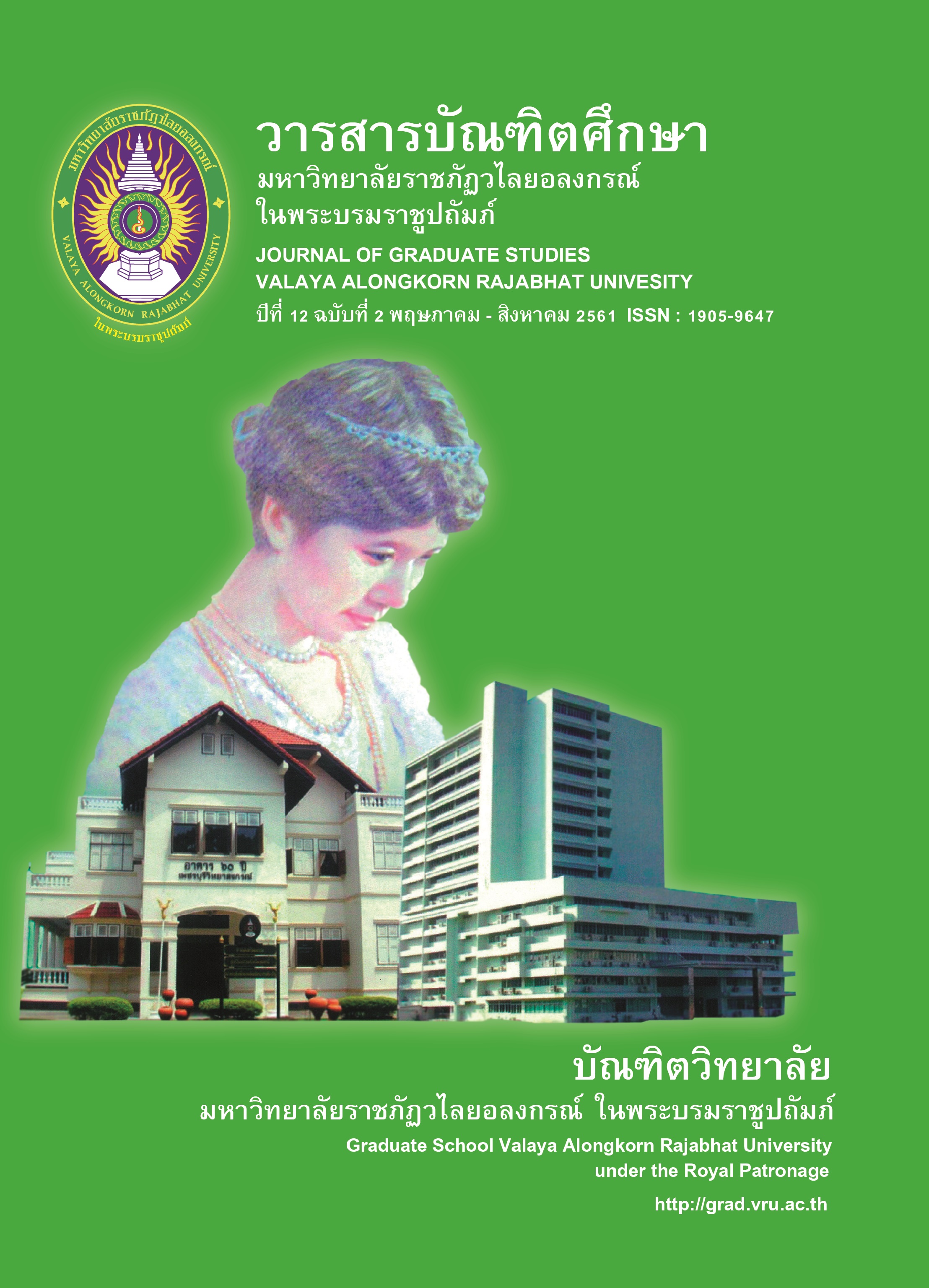THE EFFECTS OF USING MULTIPLE INTELLIGENCES ACTIVITIES TO PROMOTE ENGLISH LISTENING – SPEAKING ABILITIES AND SELF-ESTEEM AMONG MATHAYOM SUKSA 3 STUDENTS
Main Article Content
Abstract
The objectives of this study were to 1) study English listening - speaking abilities after using multiple intelligences activities, and 2) compare the students’ self-esteem before and after being taught through multiple intelligences activities. The target group were 33 Mathayom Suksa 3 students who enrolled in English listening-speaking course 23201 in the first semester of the academic year 2015 at Mae Prik Wittaya School, Lampang Province. The research instruments consisted of 7 lesson plans using multiple intelligences activities, an English listening-speaking abilities assessment form and a self-esteem evaluation test. The data obtained were analyzed for mean, standard deviation, percentage and dependent t-test.
The findings of this study were as follows:
- After using multiple intelligences activities, students’ English listening -speaking abilities passed the pre-set criteria of 60% at an excellent level.
- Students’ self-esteem after learning through multiple intelligences activities increased than those before.
Article Details

This work is licensed under a Creative Commons Attribution-NonCommercial-NoDerivatives 4.0 International License.
บทความทุกเรื่องได้รับการตรวจความถูกต้องทางวิชาการโดยผู้ทรงคุณวุฒิ ทรรศนะและข้อคิดเห็นในบทความ Journal of Global of Perspectives in Humanities and Social Sciences (J-GPHSS) มิใช่เป็นทรรศนะและความคิดของผู้จัดทำจึงมิใช่ความรับผิดชอบของบัณฑิตวิทยาลัย มหาวิทยาลัยราชภัฏวไลยอลงกรณ์ ในพระบรมราชูปถัมภ์ กองบรรณาธิการไม่สงวนสิทธิ์การคัดลอก แต่ให้อ้างอิงแหล่งที่มา
References
กรมสุขภาพจิต. (2547). คู่มือการจัดกิจกรรม “ฝึกคิดแก้ปัญหาพัฒนา EQ” (สำหรับศูนย์เพื่อนใจวัยรุ่น) พิมพ์ครั้งที่ 2. นนทบุรี: โรงพิมพ์องค์การสงเคราะห์ทหารผ่านศึก.
โฆษิต พระประเสริฐ. (2546). การสร้างแบบวัดความรู้สึกเห็นคุณค่าในตนเองสำหรับนักเรียนมัธยมศึกษาตอนต้น. วิทยานิพนธ์ศึกษาศาสตร์มหาบัณฑิต สาขาวิชาการวัดและประเมินผลการศึกษา บัณฑิตวิทยาลัย มหาวิทยาลัยเชียงใหม่.
โธมัส อาร์มสตรอง. (2542). พหุปัญญาในห้องเรียน: วิธีสอนเพื่อพัฒนาปัญญาหลายด้าน. กรุงเทพฯ: กรมวิชาการ.
นันทิยา แสงสิน. (2543). การเรียนการสอนภาษาอังกฤษเป็นภาษาที่สองหรือภาษาต่างประเทศ. ภาควิชามัธยมศึกษา: คณะศึกษาศาสตร์ มหาวิทยาลัยเชียงใหม่.
เนตรดาว มุ่งหมาย, ประสาท เนืองเฉลิม และประยูร วงศ์จันทรา. (2555). ผลการจัดการเรียนรู้วิทยาศาสตร์ตามแนวคิดพหุปัญญา เรื่องบรรยากาศในชีวิตประจำวันชั้นมัธยมศึกษาปีที่ 1. วารสารมนุษยศาสตร์และสังคมศาสตร์ มหาวิทยาลัยพะเยา. 1(2), 2-9.
สำนักวิชาการและมาตรฐานการศึกษา สำนักงานคณะกรรมการการศึกษาขั้นพื้นฐาน กระทรวงศึกษาธิการ .(2554). แนวทางการพัฒนาทักษะชีวิตผู้เรียน บูรณาการการเรียนการสอน 8 กลุ่มสาระการเรียนรู้ หลักสูตรแกนกลางการศึกษาขั้นพื้นฐาน พุทธศักราช 2551. กรุงเทพมหานคร: โรงพิมพ์ชุมนุมสหกรณ์การเกษตรแห่งประเทศไทย.
สุภัทรา อักษรานุเคราะห์. (2532). การสอนทักษะทางภาษาและวัฒนธรรม. กรุงเทพฯ: โรงพิมพ์จุฬาลงกรณ์มหาวิทยาลัย.
หฤทัย กาศวิบูลย์. (2549). การพัฒนาบทเรียนภาษาอังกฤษที่ใช้กิจกรรมตามแนวคิดทฤษฎีพหุปัญญาเพื่อส่งเสริมทักษะภาษาอังกฤษของผู้เรียนระดับกำลังพัฒนา. วิทยานิพนธ์ศึกษาศาสตร์มหาบัณฑิต สาขาวิชาการสอนภาษาอังกฤษ บัณฑิตวิทยาลัย มหาวิทยาลัยเชียงใหม่.
ปาณิสา สอนสุวิทย์. (2551). การใช้กิจกรรมพหุปัญญาเพื่อส่งเสริมความสามารถในการพูดนำเสนอเป็นภาษาอังกฤษและเจตคติเชิงบวกของนักเรียนระดับกำลังพัฒนา. วิทยานิพนธ์ ศึกษาศาสตร์มหาบัณฑิต สาขาวิชาการสอนภาษาอังกฤษ บัณฑิตวิทยาลัยมหาวิทยาลัยเชียงใหม่.
O’Sullivan, B. (2008). Notes on Assessing Speaking. Retrieved from https://.lrc.cornell. edu/ events/past/2008-2009/ papers08/osull1.pdf.
Byrne, D. (1986). Teaching Oral English. California: Longman.
Gardner, H. (1983). Frames of mind: The Theory of multiple intelligences.: London: Granada.
Lightbown, P.M. and Spada N. (1993). How Language are learned (3rd ed.) Oxford: Oxford University Press.
Mahmoud, S.A. (2008). Multiple ways to be smart: Gardener’s Theory of Multiple Intelligences and its educational implications in English teaching and oral communication. Retrieved from https://eric .ed.gov/ ?id= ED502634.
Richards, J, C. and Rogers, T.S. (2001). Approaches and and Methods in Language Teaching. Cambridge: Cambridge University.


